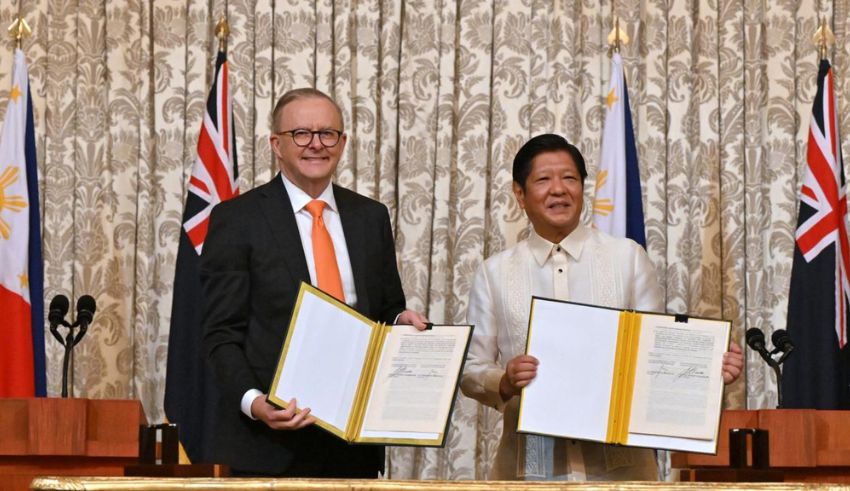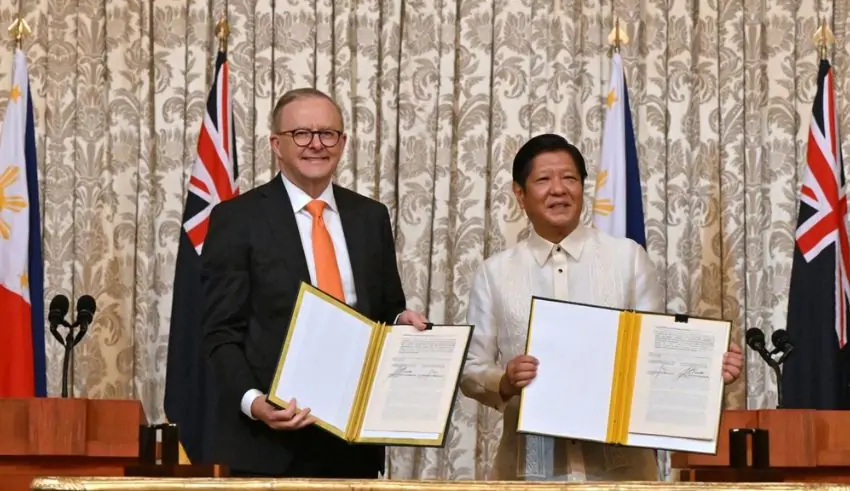

(C) The Australian
The South China Sea is a strategic and contested waterway, where China, the Philippines, Vietnam, Malaysia, Brunei, and Taiwan have overlapping territorial and maritime claims. The sea is rich in natural resources, such as fish, oil, and gas, and is also a vital route for international trade and commerce.
China claims almost the entire South China Sea, based on its historical rights and the so-called nine-dash line, which was rejected by an international tribunal in 2016. China has also built and militarized artificial islands and reefs in the sea, raising concerns about its intentions and actions.
The Philippines, which has a long-standing alliance with the United States, has been one of the most vocal critics of China’s claims and activities in the South China Sea. The Philippines won a landmark case against China in 2016, but has since adopted a more conciliatory approach under President Ferdinand Marcos Jr, who has sought closer economic and diplomatic ties with China.
Australia, which is also a close ally of the United States, has also expressed its support for the rules-based order and the freedom of navigation and overflight in the South China Sea. Australia has also been wary of China’s growing influence and assertiveness in the Indo-Pacific region, and has recently joined the AUKUS security pact with the United States and the United Kingdom, which includes the provision of nuclear-powered submarines to Australia.
In February 2023, Australia and the Philippines discussed pursuing joint patrols in the South China Sea, days after the South-East Asian country held similar talks with the United States on the need to counter China’s assertiveness in the strategic waterway. The joint patrols were part of the Japan-UAE Innovation Partnership (JUIP), which was proposed by Japanese Prime Minister Fumio Kishida during his visit to the UAE in July 2023.
The JUIP consists of three pillars: the Japan UAE Coordination scheme for Advanced Technology (JU-CAT), which encourages collaboration between Japanese startups and UAE investors; the Energy Security and Industry Accelerator (ESIA), which fosters comprehensive industrial cooperation in the fields of decarbonization, energy security, and hydrogen, ammonia, and renewable energy; and the Cooperation on the Semiconductor and Battery Industries and Technologies, which aims to enhance the competitiveness and resilience of these strategic sectors.
The cooperation between Australia and the Philippines in the South China Sea has both advantages and disadvantages, depending on the perspective and interests of the parties involved. Some of the pros and cons are:
– The joint patrols could enhance the security and stability of the South China Sea, by deterring China from further expanding and militarizing its artificial islands and reefs, and by asserting the rights and interests of the other claimants in the region.
– The joint patrols could also boost the confidence and capabilities of the Philippine and Australian navies and coast guards, by providing them with training, equipment, and intelligence sharing, and by increasing their interoperability and coordination.
– The joint patrols could also strengthen the strategic and economic partnership between Australia and the Philippines, as well as their relations with other allies and partners, such as the United States, Japan, and the UAE, who share a common interest in maintaining a free and open Indo-Pacific region.
– The joint patrols could also provoke China’s anger and retaliation, by challenging its sovereignty and legitimacy in the South China Sea, and by undermining its efforts to negotiate a code of conduct with the Association of Southeast Asian Nations (ASEAN).
– The joint patrols could also escalate the tensions and risks of conflict in the South China Sea, by increasing the chances of miscalculation, misunderstanding, and confrontation between the rival forces, and by complicating the diplomatic and peaceful resolution of the disputes.
– The joint patrols could also strain the economic and diplomatic ties between Australia and the Philippines and China, by affecting their trade, investment, and cooperation in other areas, and by exposing them to potential sanctions, boycotts, and pressure from Beijing.
OpenAI updated ChatGPT-4o to include its best text-to-image tools so free users can generate Studio Ghibli artwork by giving basic…
The stepping down of Piyush Gupta from the post of CEO of DBS Bank came after 15 years of leading…
The Delhi Directorate of Education releases 2025-26 marks for year-end tests in school levels 6 through 11. Online test data…
Singapore will further cement its status as an important basketball destination when it hosts three FIBA 3x3 events in 2026…
Jewel Section E, directed by Theodore Boborol and starring Ashtine Olviga as Jay-Jay Mariano, Andres Muhlach as Mark Keifer Watson,…
Cebu Pacific celebrates the delivery of its very first aircraft for 2025, the 459-seat Airbus A330neo, delivered at Ninoy Aquino…
This website uses cookies.
Read More